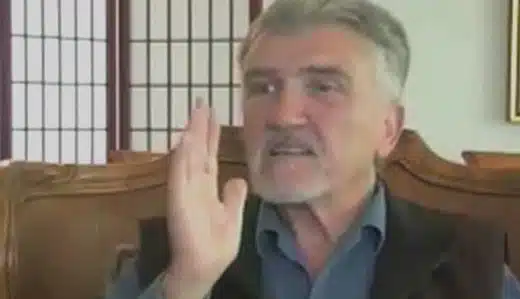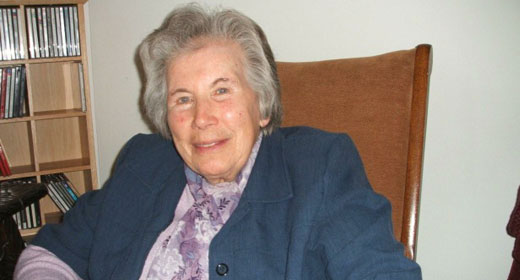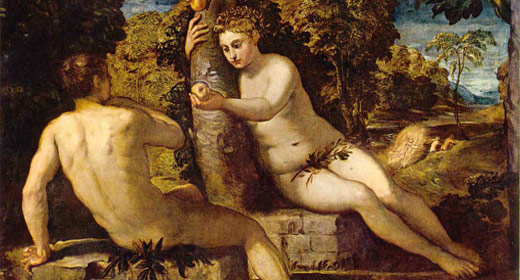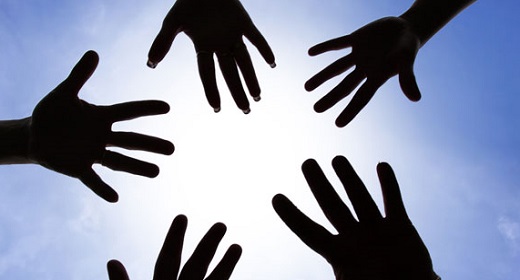Donna Quesada: You know, it’s funny you should bring up the word awakening. Because I was going to ask you…
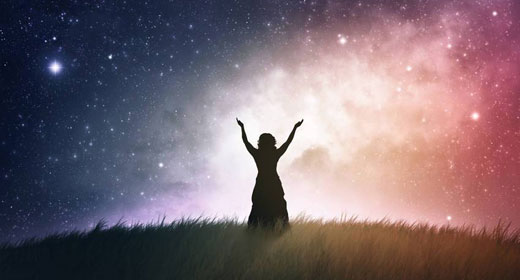
our web site is called Awaken.com, so that is something I want to ask you. What does it mean to awaken? Is there such a thing? Does it happen at once? How do you live an awakened life? And you are kind of going into that on your own. So, I want to push it a little bit. How does this discernment relate to an awakened life?
Joan Borysenko PhD:: Well, I think an awakened life is one in which you are living more from your higher self and less from ego’s fears and projections. And all of that. And I think there are people that totally wake up and I think for the rest of us, it’s a gradual awakening. Little by little. Particularly as we learn to meditate. We develop what is called meta-awareness—and that is instead of being totally fused with our thoughts—that part of us that is the observer, is meant to be meditating, I’m going to take a breath. That meta-awareness starts to operate. And when you have a reaction to something, let’s say, all of a sudden you see a person, and right away you get, like, yuck, that person feels creepy to me…
DONNA: Yep, you just feel a vibe.
JOAN: Yeah, you feel a vibe. Your meta-awareness picks up on that. And it inquires, am I projecting? Am I simply picking up a vibe that says, “Be careful…this is a dangerous person?” But you start to wake up and you don’t take your reactions to be reality. There is a moment of inquiry there. And in case you are just thinking…whatever it is…I feel creepy right now. I have a creepy feeling. You are able to do something about it. I find it interesting that some of the most ancient mind training techniques came through Hinduism. And the various schools of Buddhism, and became particular developed in Tibetan Buddhism. That these are now available to all of us…so, we can learn to reprogram, retrain our brain…build new circuits. And tame some of that reactivity of the ego. And as that happens, that is part of the awakening process, we become more and more present to the extraordinary richness, beauty and language of the world around us. Much more attuned. Plants speak a language. Animals speak a language. The clouds speak a language. And so, I’d say we become more fluent in the languages of life.
DONNA: So, awakening is becoming more present, not only to what we are hearing around us but what we are feeling within us. And it is a process…it is a process of differentiating between the voice of the ego and the voice of fear and reality…whatever that is.
JOAN: Yeah…whatever that is.
DONNA: Is the ego always bad?
JOAN: Well, you know there are two senses for the ego. Certainly, when I put on my psychologist hat…we all have to have an ego. In the psychological sense, a place where you can stand, a place where you can…I’m a worthwhile human being…I have skills…when I get out of whack, to bring me back to the center…that’s a healthy way. The healthy ego says, “I don’t have to prove anything…I’m worthy of existing.” And that’s a good thing to have. And it is a separate sense of self, but it’s from that healthy sense of self, we begin to develop more and more, a sense of compassion, that we actually begin to transcend what Albert Einstein called “the optical delusion of separateness that separates us from all that is.” So, that we can also be simultaneously present to something larger. So, the metaphor I use to understand this in life in my own mind, is…we are both a particle and a wave and our particle part is a healthy ego. And our wave transcends the ego. And we feel unity with all that is.
But it’s the unhealthy ego that needs transcending…that healthy sense we need to develop. That’s why I think there is so much interest these days in the fields of attachment to our care-takers. Did we feel safe? Because if we don’t feel safe when we were little, it’s very hard to have a sense of healthy ego…if we were traumatized in the ego. The ego needs a little bolstering up. So, the fields of attachment and trauma are important in understanding this, and building and restoring us to a healthy ego. So, have it, but also transcend it.
DONNA: It’s almost as if this trauma creates this deep sense of insecurity that causes us always to look for reassurance. And that’s kind of where the ego goes awry.
JOAN: That’s right. And you know, for years, I think, known for us in this field that there is no such thing as psychological growth distinct from spiritual growth. It’s a spiritual process, and there are a number of languages for the two things. But what they all have in common is this: That as our ego becomes secure, and as we touch the part of ourselves that goes beyond the ego…that part of itself is love itself. And I know, that sounds trite. But when you have an experience of divine union and transcendence, words make sense to you. The overwhelming sense is such a loving kindness. It’s unbelievable. You can’t believe that such loving kindness is in this universe and that it’s so personal. It’s not an impersonal thing. It’s a personal thing. A source of love and kindness knows you, thoroughly…and loves you with all your mistakes.
I’ve had a lot of meetings with the light. So, I am speaking from personal experience. As you grow psychologically, you grow spiritually. You grow in love and kindness. These days, at least in the psychological circles, compassion training has become a very important thing. As people begin to develop more compassion for themselves and more compassion for others…that’s the part of us that transcends the limit of our own circumscribed self. As Einstein put it, the circle of loved ones closest to us…so that compassion gradually extends to all beings and to nature and then beyond that, to the mysterious reality. The source of being from which we come. Such gratitude and forgiveness. Mercy and love and compassion develop. And if you are a Christian, it’s like, “hey, these are the fruits of the spirit that Jesus talked about.” How do you tell…how do you tell a person is growing inside?…because they manifest those fruits of forgiveness and love and patience and joy and mercy…
DONNA: Here’s what I wonder about, Joan. To use your case as an example, you had this traumatic experience in life which led to a direct experience through prayer…divine…which transformed you. How do we teach compassion without that kind of direct experience? Can it be taught?
JOAN: It can be taught. That’s what is so exciting. You know, when my husband, Gordon, and I wrote the book Your Soul’s Compass—that was the book that we interview the 27 saviors. What we discovered there…particularly, the Buddhist teachers would say, “well, what is Buddhism? It’s all about developing compassion. It’s an entire life of learning to cultivate kindness and compassion.” And Buddhism has the tools for that, which gradually make their way into psychology. For example, there have been a number of studies looking at the slogans of Tibetan Buddhism. I don’t know if you’ve ever seen this deck of Pema Chodron compassion cards. It’s cool. It’s the 59 Lojong slogans of Tibetan Buddhism and they are all different aspects of compassion in daily life. And you just pick a card and on the front side is whatever the slogan is. And if you turn it over on the back side, Pema has given just a sentence or two of explanation, so you can remember during the day to be compassionate, to have an exponentiate inside you. So that’s the Lojong slogans.
That love and kindness meditations have been studied… So, for example, at Emery University, Emery does a lot of study on this type of thing. There is a Tibetan Monastery close by. And there has been a collaboration of studying these old Buddhist principles. You can take students and in six weeks the practice of the loving, kindness meditation…sending blessings of love and kindness… May I be at peace… May my heart remain open… May I be happy... It’s blessings to yourself and others. That, plus the Lojong slogans.
DONNA: So, it’s not just reading. Saying little prayers throughout the day, but maybe not calling them prayers, so as to make it more palatable to people who might not be comfortable with that language…which is a practice.
JOAN: Well, it is a practice. You know, a very dear friend of mine, Karen Drucker…she has written 20 albums of positive music, for which she wins a prize every year. And she’s taken the most basic love and kindness blessings and it’s a song. (Singing) May I be filled with love and kindness…May I be well… May I be peaceful and at ease… And may I be happy… And who wouldn’t want to be happy? You’re just wishing the best for yourself. And you sing it for other people. You sing it for your loved ones. It’s so simple and easy and it becomes an ear worm. You feel it repeating during the day. You can’t stop it. It’s such a great way to take ancient wisdom and bring it into a modern thing. It doesn’t make people think, I’m doing some Buddhist religious thing. Just sing a song.
DONNA: So, would it be fair to say that practice, and I wanted to ask you this anyway…do you need to have a meditation practice? It’s like any practice and that’s a very Hindu way of looking at it. You know the different yogas…you can be devotional, you can be intellectual about it… Do you agree that practice can take different forms and do you have to have a teacher?
Joan: Well, practice can take different forms. For example, not everybody is going to sit and do mindfulness meditation every day, but everybody can take a shower and say, “I love the foam in my hair…I love the hot water.” And instead of planning my day, I’m just going to let go and get back to the pleasure of the moment. I’ll get to the planning of the day, later. That’s a meditation…action. And that’s a wonderful thing for anybody to learn to do. And you can learn mindfulness and meta-awareness through doing that.
And here’s the thing, there are plenty of teachers available. You want to learn mindfulness, you can go online and find a course by Jon Kabat-Zinn. That will teach you mindfulness. And of course, with anything, you can teach yourself but generally speaking, you can make more progress faster if you take a course where somebody points out the territory. And then once you have the big picture you can go into it more, yourself. So, having some teaching is always useful. And then there are people who are just self-taught in all these things. I think there is room in all these things for every different approach, Donna.
DONNA: How do we balance this individual development of awareness with our responsibility to the environment, for example? Or a world that drives us to angst…which drives us to practice in the first place.
JOAN: That, of course, is a great question and as you begin to train a little bit in compassion, what happens of course, is the suffering of the world becomes more acute and more obvious to you. But compassion is more than empathy. It’s not just feeling the difficulties of the world, it’s the desire to do something to relieve that. And on a very basic level you can do a process of love and kindness. You can do a Tonglen meditation. Where you can literally breathe in from all your pores, the heaviness of a part of the world that is suffering, And you breathe back the light within your own being to them. You can do that at a very basic level. You can also get involved. The first is a little subtler act of activism. But there are many acts of activism.
I was telling you before I started…my husband is going to have a group of people coming in here. He is organizing a group to implement hopefully, making Santa Fe a compassionate city. There are several hundred compassionate cities. And that’s an amazing thing. When different branches of a city all activate to say, “What is our vision?” Vision is compassion, whether you are looking at education or whether you are looking at the sewer system. Whether you are looking at…whatever. And there have always been people and there will always be people who take that inner drive for compassion and bring it outside. But even if your only service to the world is transforming yourself, that is enough because we all touch our families…we touch the people we interact with. And everybody really does long for the same thing. Paraphrasing the Dalai Lama, “We all want to be happy!”
We all want to be peaceful. Who wants to suffer? And so, it’s a contagious feeling when you get around people who are peaceful. When you get around people who pass up the bait! When someone says something upsetting and instead has a more enlightened response to it. That’s what impresses people, not what we say but who we are. We all want a little of that.
DONNA: It seems like sometimes we get the feeling that we are just not getting anywhere. Do you need to have a quote “dark night of the soul” as an impetus to this kind of awaking and growth of compassion?
JOAN: That’s always a great question. This is an old question. I first heard it posed by William James, who was around at the beginning of the last century…1800’s, early 1900’s. And you might have read his book, Varieties of Religious Experience, which was a set of lectures at Harvard. And William James was the father of modern psychology. And he was also deep into the perennial wisdom and meditation and all that. He believed that we woke up in one of two ways. He said, the more common way is through crisis. And another way—maybe a little less common—is through gradual awakening…through “disillusion.” The disillusion of the difficulties that hide that true light of the heart, of the sun within your heart…you don’t have to develop it because it’s always there; it’s your true nature.
Consider your life best as a metaphor. You know, I know a woman, and what an enlightened being she is. What Love. And for her it’s been a gradual awakening. I look at someone like me and I’m more… Every once in a while, I just seem to have to go to hell. To the netherworlds! And then finally it gets cracked wide open and I think, “I wish I didn’t have to keep doing this!”
DONNA: Well, as promised that’s a pretty good place to leave it. Is there anything else you would like to share with out Awaken listeners, Joan?
JOAN: Just an invitation. They can come and check out my web-site which is just my name joanborysenko.com And you can also find me on Facebook at the Joan Borysenko Community. That’s good, and I do a lot of public programs. And I’ve got a lot of books so… there are some resources for people.
DONNA: Joan, it was just a pleasure to talk to you. I thank you for joining us to today for this interview. Personally, I’ve enjoyed it and I know our viewers will enjoy it, as well.
JOAN: Thank you much, Donna. You are a great interviewer. What A joy.
DONNA: Thank You! It was mutual. Bye bye!
JOAN: Bye!
View Part I Here: God Is A Mystery


